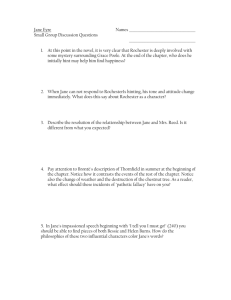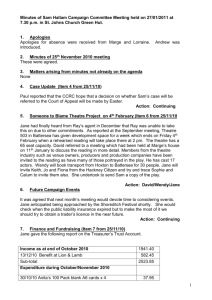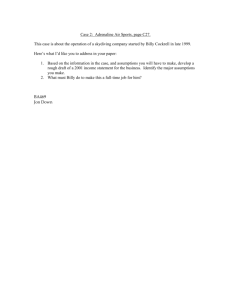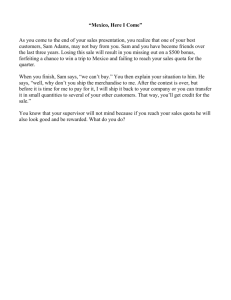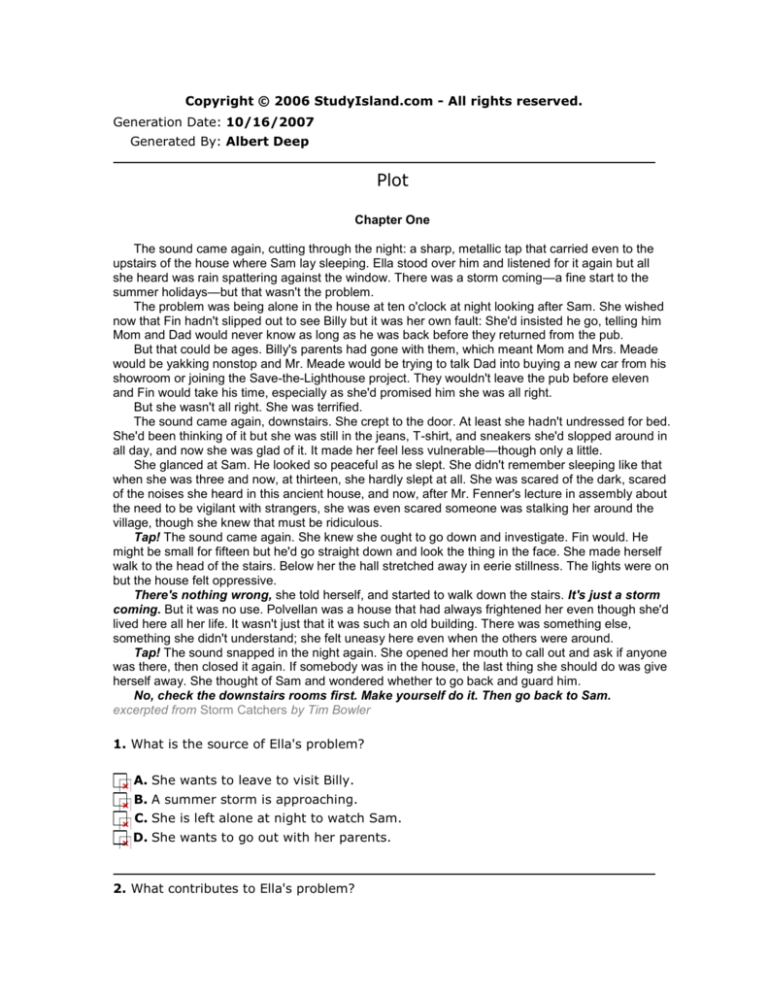
Copyright © 2006 StudyIsland.com - All rights reserved.
Generation Date: 10/16/2007
Generated By: Albert Deep
Plot
Chapter One
The sound came again, cutting through the night: a sharp, metallic tap that carried even to the
upstairs of the house where Sam lay sleeping. Ella stood over him and listened for it again but all
she heard was rain spattering against the window. There was a storm coming—a fine start to the
summer holidays—but that wasn't the problem.
The problem was being alone in the house at ten o'clock at night looking after Sam. She wished
now that Fin hadn't slipped out to see Billy but it was her own fault: She'd insisted he go, telling him
Mom and Dad would never know as long as he was back before they returned from the pub.
But that could be ages. Billy's parents had gone with them, which meant Mom and Mrs. Meade
would be yakking nonstop and Mr. Meade would be trying to talk Dad into buying a new car from his
showroom or joining the Save-the-Lighthouse project. They wouldn't leave the pub before eleven
and Fin would take his time, especially as she'd promised him she was all right.
But she wasn't all right. She was terrified.
The sound came again, downstairs. She crept to the door. At least she hadn't undressed for bed.
She'd been thinking of it but she was still in the jeans, T-shirt, and sneakers she'd slopped around in
all day, and now she was glad of it. It made her feel less vulnerable—though only a little.
She glanced at Sam. He looked so peaceful as he slept. She didn't remember sleeping like that
when she was three and now, at thirteen, she hardly slept at all. She was scared of the dark, scared
of the noises she heard in this ancient house, and now, after Mr. Fenner's lecture in assembly about
the need to be vigilant with strangers, she was even scared someone was stalking her around the
village, though she knew that must be ridiculous.
Tap! The sound came again. She knew she ought to go down and investigate. Fin would. He
might be small for fifteen but he'd go straight down and look the thing in the face. She made herself
walk to the head of the stairs. Below her the hall stretched away in eerie stillness. The lights were on
but the house felt oppressive.
There's nothing wrong, she told herself, and started to walk down the stairs. It's just a storm
coming. But it was no use. Polvellan was a house that had always frightened her even though she'd
lived here all her life. It wasn't just that it was such an old building. There was something else,
something she didn't understand; she felt uneasy here even when the others were around.
Tap! The sound snapped in the night again. She opened her mouth to call out and ask if anyone
was there, then closed it again. If somebody was in the house, the last thing she should do was give
herself away. She thought of Sam and wondered whether to go back and guard him.
No, check the downstairs rooms first. Make yourself do it. Then go back to Sam.
excerpted from Storm Catchers by Tim Bowler
1. What is the source of Ella's problem?
A. She wants to leave to visit Billy.
B. A summer storm is approaching.
C. She is left alone at night to watch Sam.
D. She wants to go out with her parents.
2. What contributes to Ella's problem?
A. Ella is not dressed.
B. Fin left to visit Billy.
C. Sam is sleeping upstairs.
D. Billy's parents are with hers.
3. What is the main conflict in this selection?
A. Mr. Meade tried to talk Ella's dad into things at dinner.
B. Ella feels she must go downstairs to investigate a tapping noise.
C. Ella is scared by Mr. Fenner's lecture about strangers.
D. Fin has to sneak back from Billy's before eleven o'clock.
4. The last paragraphs of this selection build suspense by
A. giving details about Fin's plan to sneak out and see Billy and return.
B. making the reader want to know what is making the strange sound.
C. describing what clothing Ella was wearing because she hadn't changed for bed.
D. describing what Ella's parents and the Meade must be doing at the pub.
5. How does the situation affect Ella?
A. It makes her tired and want to sleep.
B. It makes her terrified.
C. It makes her stronger and braver.
D. She is glad to be in charge.
Chapter One
There was no possibility of taking a walk that day. We had been wandering, indeed, in the
leafless shrubbery an hour in the morning; but since dinner (Mrs. Reed, when there was no
company, dined early) the cold winter wind had brought with it clouds so sombre, and a rain so
penetrating, that further outdoor exercise was now out of the question.
I was glad of it; I never liked long walks, especially on chilly afternoons: dreadful to me was the
coming home in the raw twilight, with nipped fingers and toes, and a heart saddened by the chidings
of Bessie, the nurse, and humbled by the consciousness of my physical inferiority to Eliza, John, and
Georgiana Reed.
The said Eliza, John, and Georgiana were now clustered round their mamma in the drawingroom: she lay reclined on a sofa by the fireside, and with her darlings about her (for the time neither
quarrelling nor crying) looked perfectly happy. Me, she had dispensed from joining the group, saying,
"She regretted to be under the necessity of keeping me at a distance; but that until she heard from
Bessie, and could discover by her own observation that I was endeavouring in good earnest to
acquire a more sociable and childlike disposition, a more attractive and sprightly manner—
something lighter, franker, more natural, as it were—she really must exclude me from privileges
intended only for contented, happy little children."
"What does Bessie say I have done?" I asked.
"Jane, I don't like cavillers or questioners; besides, there is something truly forbidding in a child
taking up her elders in that manner. Be seated somewhere; and until you can speak pleasantly,
remain silent."
A small breakfast-room adjoined the drawing-room, I slipped in there. It contained a bookcase; I
soon possessed myself of a volume, taking care that it should be one stored with pictures. I mounted
into the window-seat: gathering up my feet, I sat crosslegged.
I returned to my book—Bewick's History of British Birds. There were certain introductory pages
that, child as I was, I could not pass quite as a blank. I formed an idea of my own: shadowy, like all
the half-comprehended notions that float dim through children's brains, but strangely impressive.
Each picture told a story; mysterious often to my undeveloped understanding and imperfect
feelings, yet ever profoundly interesting: as interesting as the tales Bessie sometimes narrated on
winter evenings, when she chanced to be in good humour; and when, having brought her ironingtable to the nursery-hearth, she allowed us to sit about it, and while she got up Mrs. Reed's lace
frills, and crimped her nightcap borders, fed our eager attention with passages of love and
adventure.
With Bewick on my knee, I was then happy: happy at least in my way. I feared nothing but
interruption, and that came too soon. The breakfast-room door was opened.
excerpted from Jane Eyre by Charlotte Bronte
6. How does the narrator react to the conflict the weather causes?
A. She makes the other children go out in the cold afternoon.
B. She is glad not to be out in the afternoon.
C. It makes her jealous of Eliza, John, and Georgiana Reed
D. It disappoints her becuase she likes chilly afternoons.
7. How does the weather affect the plot at the beginning of the passage?
A. It makes the children want to take a longer walk.
B. It makes Mrs. Reed dine later than usual.
C. It makes an afternoon walk too difficult.
D. It makes the nurse get lost, wandering in the shrubbery.
8. What conflict does the narrator encounter at the end of the passage?
A. She is forced to take a walk out in the cold.
B. She is called to sit by the fireside.
C. She is punished by the nurse, Bessie.
D. She is interrupted while trying to read.
9. How does the narrator deal with being excluded?
A. She decides to sit in the drawing-room anyway.
B. She takes a walk outside in the chilly afternoon.
C. She goes off on her own to read a book.
D. She picks a fight with the nurse, Bessie.
10. What conflict does the mother (Mrs. Reed) have with the narrator (Jane)?
A. She believe that the nurse, Bessie, is too friendly with Jane.
B. She wants Jane to sit by the fireside with her children.
C. She believes Jane should have gone out in the cold afternoon.
D. She believes Jane should behave more pleasantly.
Chapter 2
I
As he went down the narrow staircase, covered with its dingy and threadbare carpet, he found
the house so full of dirty yellow haze that he realized that the fog must be of the extraordinary ones
which are remembered in after-years as abnormal specimens of their kind. He recalled that there
had been one of the sort three years before, and that traffic and business had been almost entirely
stopped by it, that accidents had happened in the streets, and that people having lost their way had
wandered about turning corners until they found themselves far from their intended destinations and
obliged to take refuge in hotels or the houses of hospitable strangers. Curious incidents had
occurred and odd stories were told by those who had felt themselves obliged by circumstances to go
out into the baffling gloom. He guessed that something of a like nature had fallen upon the town
again. The gas-light on the landings and in the melancholy hall burned feebly--so feebly that one got
but a vague view of the rickety hat-stand and the shabby overcoats and head-gear hanging upon it.
It was well for him that he had but a corner or so to turn before he reached the shop.
When he opened the street-door he saw that the fog was, upon the whole, perhaps even heavier
and more obscuring, if possible, than the one so well remembered. He could not see anything three
feet before him; he could not see with distinctness anything two feet ahead. The sensation of
stepping forward was uncertain and mysterious enough to be almost appalling. A man not
sufficiently cautious might have fallen into any open hole in his path. He kept as closely as possible
to the sides of the houses. It would have been easy to walk off the pavement into the middle of the
street but for the edges of the curb and the step downward from its level. Traffic had almost
absolutely ceased. The blind feeling of the thing was rather awful. Though but few pedestrians were
out, he found himself once or twice brushing against or coming into forcible contact with men feeling
their way about like himself.
"One turn to the right," he repeated mentally, "two to the left, and the place is at the corner of the
other side of the street."
He managed to reach it at last, but it had been a slow, and therefore, long journey. All the gasjets the little shop owned were lighted, but even under their flare the articles in the window hung in
the haze like the dreary, dangling ghosts of things recently executed.
excerpted from The Dawn of a To-morrow by Frances Hodgson Burnett
11. How does the man help resolve the conflict?
A. He mentally repeats the turns he needs to make to reach the shop.
B. He makes some pedestrians in the street show him the way.
C. He gives up his journey because the fog is thick and goes back home.
D. He decides to take shelter in a hotel or a house of a hospital stranger.
12. What is the conflict in the story excerpt above?
A. A man decides to stay inside because of bad weather.
B. A man gets in fights with pedestrians on the streets.
C. A man struggles to make his way through foggy streets.
D. A man cannot find a shop because of heavy rains.
Chapter 2
II
Inside the place was almost dark. It was a shabby pawnshop, and behind the counter lounged a
shabby man with an unshaven face. After making payment, he noted that he still possessed some
coins. The most decent thing would be to give them away.
He thought of this as he left the shop and began to cross the street. His mind was wandering, and
he was less watchful. Suddenly, a carriage appeared immediately in his path. The horse's head
loomed above his own. He whirled aside involuntarily and went on. His movement had been to swift
for him to realize in which direction he had turned. He was unaware that he crossed the street
backward instead of forward. He turned a corner, turned another, and suddenly understood, after
walking down the street, that he was in a strange place and had lost his bearings.
He could not be far from his lodgings, but he felt like a blind man turned out of the path he knew.
He would not stop and address anyone. He could not be certain to whom he might find himself
speaking. He would wander until he came upon a clue. He went on.
He found himself at least rambling along mechanically, like a man in a dream—a nightmare. His
lodgings were not far from the embankment, and he knew at last that he was wandering along it and
had reached one of the bridges. He stopped near it and leaned upon the walls, looking down.
As he drew back, he heard something fall with the tinkling sound of coin on the pavement. When
he had been in the pawnbroker's, he had taken the gold and thrust it carelessly into his waistcoat
pocket, thinking it would be easy to reach when he gave it to a beggar. Some movement he made in
bending had caused a coin to slip out, and it had fallen upon the stones.
He did not intend to pick it up, but he heard a shuffling movement near him. What he had thought
a bundle of rags was stirring. As he bent to look at it, a small head, covered with brilliant red hair,
thrust itself out, a small face turning to look up at him slyly with deep-set black eyes. It was a girl,
about twelve years old. She pointed with a chapped and dirty hand at the coin.
"Pick it up," he said. "You may have it."
Her wild shuffle forward was an actual leap. The hand snatched at the coin. She was evidently
afraid that he was insincere or would change his mind. The next minute she was on her feet and
ready for flight.
"Stop," he said. "I've got more to give away."
She hesitated, not believing him, yet feeling it madness to lose a chance. "More?" she gasped in
a street-strained voice. Then she drew nearer to him, and a change came upon her face. It made her
look oddly human.
"Gawd, mister!" she said. "You give away a coin like it was nothin'—an' yer've got more!"
She was, for her years, so ugly and hardened in voice, skin, and manner that she fascinated him.
He stood and stared at her.
"Do you know where we are?" he asked glumly.
She sidled nearer, her sharp eyes on his face. "I bin watchin' yer," she said. "I sat down and
pulled the sack over me 'ead to breathe inside it an' get a bit warm. I watched yer through a 'ole in
me sack. You looked all turned 'round. Come along er me an' I'll show yer the way. If yer've give me
that coin straight, I'll go with yer myself. Come on, mister."
adapted from The Dawn of a To-morrow by Frances Hodgson Burnett
13. What is the conflict in the story excerpt above?
A. A man sees a young girl standing on a bridge.
B. A man loses a gold coin while standing on a bridge.
C. A man wanders the streets because he becomes lost.
D. A man decides to buy something in a pawnshop.
14. What makes it more difficult for the man to resolve his conflict?
A. The pawnbroker gives him the wrong directions.
B. He refuses to stop and ask anyone for directions.
C. He meets a little girl on a bridge and refuses to help her out.
D. He loses all of his money when he stops on a bridge.
15. What does the man plan to do with his remaining coins?
A. He intends to tell the pawnbroker to keep them all.
B. He intends to take them home and save them.
C. He intends to give them to a beggar who is in need.
D. He intends to throw them off of a bridge.
Answers
1. C
2. B
3. B
4. B
5. B
6. B
7. C
8. D
9. C
10. D
11. A
12. C
13. C
14. B
15. C
Explanations
1. At the beginning of the passage, it states, "There was a storm coming—a fine
start to the summer holidays—but that wasn't the problem. The problem was
being alone in the house at ten o'clock at night looking after Sam."
2. Fin could have helped her, but she approved of him leaving to see Billy. Now she
doesn't have anyone to with her but Sam.
3. Although Ella is frightened by the situation, she feels she has to go downstairs to
investigate the noise. She wants to protect Sam and face the situation head-on
like she knew Fin would.
4. The author repeats the tapping sounds at shorter intervals. They begin to seem
more ominous as Ella tries to overcome her fright to investigate the strange
sounds.
5. Now that Fin has left and she is alone with Sam, she is terrified of the night and
by the strange sound.
6. The narrator states, "I was glad of it; I never liked long walks, especially on chilly
afternoons: dreadful to me was the coming home in the raw twilight, with nipped
fingers and toes. . . ."
7. The narrator states, "There was no possibility of taking a walk that day. . . . the
cold winter wind had brought with it clouds so sombre, and a rain so penetrating,
that further outdoor exercise was now out of the question."
8. The narrator is alone reading a book, happy in her own way. She fears nothing
but interruption, which she says came too soon, when the door to the room is
opened.
9. The narrator slips off into a small breakfast-room by herself and takes a book
with pictures from the bookcase.
10. Mrs. Reed keeps Jane at a distance and excludes her from "privileges intended
only for contented, happy little children." She states that she is awaiting to hear
from the nurse, Bessie, that Jane shows a "more sociable and childlike
disposition, a more attractive and sprightly manner." Mrs. Reed further tells Jane
that she doesn't like to be questioned by a child. She says, "Be seated
somewhere; and until you can speak pleasantly, remain silent."
11. The man knows he doesn't have far to go to make it from the house to the shop.
He knows the corners he has to turn. He mentally repeats the directions and
finds his way through the dense fog.
12. A man steps out into the streets, which are covered in a thick fog and finds his
way to a shop.
13. Although all of the answer choices are events that do occur in the passage, only
one is a conflict that is the source of the plot. The man becomes lost near the
beginning of the passage. He spends the rest of it wandering the streets. His
problem, or conflict, is how he's going to make his way back home.
14. Soon after he becomes lost, the passage states, "He would not stop and address
anyone. There could be no certainty as to whom he might find himself speaking
to." He decides to wander about until he comes upon something he recognizes.
15. Early in the passage, the man thinks that the decent thing to do would be to give
away his remaining coins. He places them in the pocket of his coat so he can
easily reach them when he comes upon a beggar who would be better off with
the money.
Copyright © 2006 StudyIsland.com - All rights reserved.


